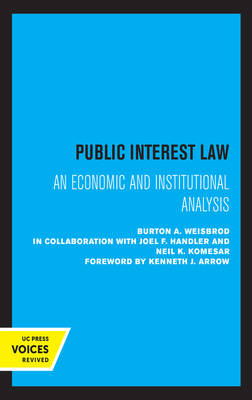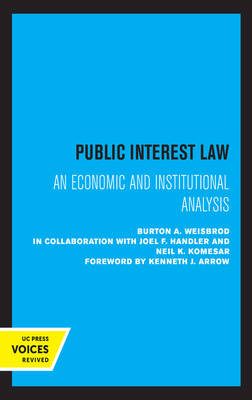
- Afhalen na 1 uur in een winkel met voorraad
- Gratis thuislevering in België vanaf € 30
- Ruim aanbod met 7 miljoen producten
- Afhalen na 1 uur in een winkel met voorraad
- Gratis thuislevering in België vanaf € 30
- Ruim aanbod met 7 miljoen producten
Zoeken
Public Interest Law
An Economic and Institutional Analysis
Burton a Weisbrod, Joel F Handler, Neil K Komesar
Paperback | Engels
€ 64,45
+ 128 punten
Uitvoering
Omschrijving
What is public interest law? How effective is it? What are the limits to litigation as a mechanism for conflict resolution? In this study, economists, lawyers, and sociologists evaluate an institutional form that is new to American society and, indeed, to the world--the public interest law (PIL) organization. The book introduces the reader to the structure, resources, and activities of this "nonprofit industry," and also to the factors that affect PIL firms in their choices of cases and methods of handling them. The authors examine PIL's vast range of contemporary public policy concerns. These incude such general topics as the environment, consumerism, housing, employment discrimination, medical care, occupational health and safety, education finance, and taxation. A number of base studies are presented, and a method for economic analysis and evaluation is introduced and applied. The study points to PIL's success in advocating under-represented interests, in winning courtroom decisions, and in translating legal victories into reallocations of resources. At the same time, it notes the bias of PIL towards test-case litigation, a propensity to focus on judicial victories rather than on real social change, and a tendency to use lawyers even when other types of professionals might be more effective. Many of these problems stem from uncertainty of funding and legal restrictions on "nonprofit" organizations. The result is a set of hurdles that distracts PIL firms from their principal goals. The authors do not limit themselves to PIL, but comment on the effectiveness of legal instruments as devices for social change, and on the behavior of the voluntary nonprofit sector, a little-studied portion of the economy. The book presents a fresh approach to the study of both collective-type economic problems and institutional setting in which public interest law works. This title is part of UC Press's Voices Revived program, which commemorates University of California Press's mission to seek out and cultivate the brightest minds and give them voice, reach, and impact. Drawing on a backlist dating to 1893, Voices Revived makes high-quality, peer-reviewed scholarship accessible once again using print-on-demand technology. This title was originally published in 1978.
Specificaties
Betrokkenen
- Auteur(s):
- Uitgeverij:
Inhoud
- Aantal bladzijden:
- 594
- Taal:
- Engels
Eigenschappen
- Productcode (EAN):
- 9780520305823
- Verschijningsdatum:
- 28/05/2021
- Uitvoering:
- Paperback
- Formaat:
- Trade paperback (VS)
- Afmetingen:
- 178 mm x 254 mm

Alleen bij Standaard Boekhandel
+ 128 punten op je klantenkaart van Standaard Boekhandel
Beoordelingen
We publiceren alleen reviews die voldoen aan de voorwaarden voor reviews. Bekijk onze voorwaarden voor reviews.











